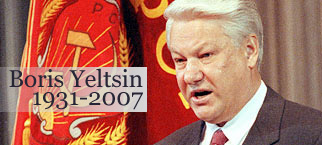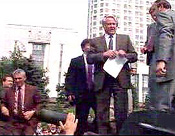 |
 |
04.23.07

Former Russian Leader Boris Yeltsin Dead at 76 The flamboyant Boris Yeltsin (1931-2007), died today of heart failure at the age of 76. Russia's first freely elected president has been credited with engineering the final collapse of the Soviet Union and pushing the country into democracy and a market economy. The flamboyant Boris Yeltsin (1931-2007), died today of heart failure at the age of 76. Russia's first freely elected president has been credited with engineering the final collapse of the Soviet Union and pushing the country into democracy and a market economy.
The Financial Times comments, “Boris Yeltsin had the physical and moral strength to bear on his shoulders the colossal burden of a country in a ferment of transition, its economy struggling with the twin tasks of discarding a tenacious old system and adjusting to an unfamiliarly fast-moving new one. At the beginning of his rule he was able to grasp, either instinctively or through a quick intelligence, much of what was required.” His contemporaries may judge him a bit harsher remembering him for being out of touch and hesitant to act against crime and corruption. Yet on the international stage, many will remember when in August 1991, he climbed on top of a tank to successfully stare down a coup attempt against Gorbachev. His open defiance clearly marked the end of the USSR.  Yeltsin’s leadership by and large, did not rely on status and fear. Very much the strategic leader, he developed a populist style. He had an ability to connect with the Russian people. It is from here that he derived much of his power. His problem was that didn’t really didn’t know what to do with the power once he got it. The Economist concludes, “The former construction engineer was not a great builder of institutions; the democracy was flawed. But he had the right instincts. For liberating Russians from the yoke of the one-party state and the planned economy, he deserves immense gratitude. Yet his nepotistic and capricious rule spawned colossal lawlessness and corruption, paving the way for his authoritarian successor, Vladimir Putin.” World Reaction to His Death: "Russia has a lost a brilliant reformer. No-one has done as much for Russia as Yeltsin did. He was a unique person and absolutely Russian in his soul, in his impulsiveness and in his intellect." "He is best remembered when standing up to the coup d'etat aimed at restoring a dictatorial regime in Russia. With great personal courage he had merit in defending freedom. The Commission sends its condolences to Mr Yeltsin's family, the Russian authorities and the people of Russia." Boris Yeltsin in his own words:
Posted by Michael McKinney at 10:52 AM
|
BUILD YOUR KNOWLEDGE
 

How to Do Your Start-Up Right STRAIGHT TALK FOR START-UPS 
Grow Your Leadership Skills NEW AND UPCOMING LEADERSHIP BOOKS 
Leadership Minute BITE-SIZE CONCEPTS YOU CAN CHEW ON 
Classic Leadership Books BOOKS TO READ BEFORE YOU LEAD |